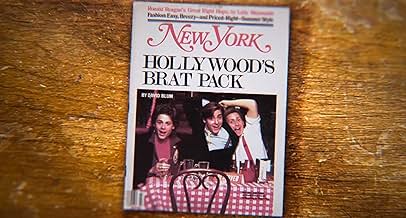PUNTUACIÓN EN IMDb
6,5/10
6,6 mil
TU PUNTUACIÓN
Se centra en las películas de los años 80 protagonizadas por el "Brat Pack" y su profundo impacto en las vidas de las jóvenes estrellas.Se centra en las películas de los años 80 protagonizadas por el "Brat Pack" y su profundo impacto en las vidas de las jóvenes estrellas.Se centra en las películas de los años 80 protagonizadas por el "Brat Pack" y su profundo impacto en las vidas de las jóvenes estrellas.
- Premios
- 1 nominación en total
Argumento
¿Sabías que...?
- CuriosidadesAndrew McCarthy reached out to Judd Nelson to join The Brat Pack reunion but Nelson "politely declined".
- Citas
Andrew McCarthy: For those of us experiencing the brat pack from the inside, it was something very different.
- ConexionesFeatures Today (1952)
- Banda sonoraDon't You (Forget About Me)
Written by Keith Forsey and Steve Schiff (as Steven W. Schiff)
Performed by Simple Minds
Reseña destacada
It's interesting to hear what other reviewers have to say about director Andrew McCarthy's vision and compilation of this documentary. Words such as whiny or whack always seem to accompany people's shortsidedness and forget that even though this is not the typical life, it is still someone's life.
What was most interesting is to see the different reactions of those who were in the Brat Pack and those who were Brat Pack "Adjacent." McCarthy's story comes from a perspective that an article written by a journalist, which we come to find out had gotten his idea from a dinner where he was labeled. Being 29 in the 80's wasn't considered young and he was looking for something to propel him to the next stage of his career. So were McCarthy, Nelson, Ringwald, Sheedy, Lowe, Moore and Estevez. The main difference is that the journalist's life wasn't nearly affected the way he wanted, and had no remorse for how it might have affected the lives of those he wrote about.
The issue is that we as humans root for people to be successful until we feel they're too successful, become jealous and ultimately find a way to knock them down a peg. Granted it comes with fame and it just so happened that it hit McCarthy, Nelson and Ringwald the hardest. The others have gone on to much longer and more diverse careers, yet we have a hard time feeling sorry for those people who seemingly had it easy.
Ask yourself if there's an event in your life that you still haven't dealt with. If you have adjusted to all trauma, kudos to you! Do you know someone in your family that hasn't? I think this was the crux of what McCarthy was trying to figure out through the exploration of people that meant a great deal to him at one time, yet never really got the answers to why it bothered everyone so. You can see the natural catharsis he goes through as he talks to Sheedy, Lowe, and even a casting director that gave him a different spin on the stigma of the Brat Pack.
All in all, the lesson that they all took mostly 30 years to learn is that you're presented with two choices when being pigeon holed in Hollywood. You can allow it to dictate your career for the worse or you can rise above it like several of them did. I believe that McCarthy got the peace he was searching for.
Regardless if you like the documentary or not, movies would not be the same without their generational success.
What was most interesting is to see the different reactions of those who were in the Brat Pack and those who were Brat Pack "Adjacent." McCarthy's story comes from a perspective that an article written by a journalist, which we come to find out had gotten his idea from a dinner where he was labeled. Being 29 in the 80's wasn't considered young and he was looking for something to propel him to the next stage of his career. So were McCarthy, Nelson, Ringwald, Sheedy, Lowe, Moore and Estevez. The main difference is that the journalist's life wasn't nearly affected the way he wanted, and had no remorse for how it might have affected the lives of those he wrote about.
The issue is that we as humans root for people to be successful until we feel they're too successful, become jealous and ultimately find a way to knock them down a peg. Granted it comes with fame and it just so happened that it hit McCarthy, Nelson and Ringwald the hardest. The others have gone on to much longer and more diverse careers, yet we have a hard time feeling sorry for those people who seemingly had it easy.
Ask yourself if there's an event in your life that you still haven't dealt with. If you have adjusted to all trauma, kudos to you! Do you know someone in your family that hasn't? I think this was the crux of what McCarthy was trying to figure out through the exploration of people that meant a great deal to him at one time, yet never really got the answers to why it bothered everyone so. You can see the natural catharsis he goes through as he talks to Sheedy, Lowe, and even a casting director that gave him a different spin on the stigma of the Brat Pack.
All in all, the lesson that they all took mostly 30 years to learn is that you're presented with two choices when being pigeon holed in Hollywood. You can allow it to dictate your career for the worse or you can rise above it like several of them did. I believe that McCarthy got the peace he was searching for.
Regardless if you like the documentary or not, movies would not be the same without their generational success.
- ugagolferdawg
- 13 jun 2024
- Enlace permanente
Selecciones populares
Inicia sesión para calificar y añadir a tu lista para recibir recomendaciones personalizadas
Detalles
- Duración1 hora 32 minutos
- Color
- Mezcla de sonido
Contribuir a esta página
Sugerir un cambio o añadir el contenido que falta

Principal laguna de datos
What is the Canadian French language plot outline for Brats: las jóvenes estrellas de los 80 (2024)?
Responde



































